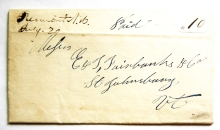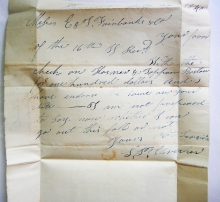Year:
Extremely clean and fresh stampless folded business letter with manuscript postmark to Vermont's prominent E & F Fairbanks Company, St. Johnsbury. Credit for the St. Johnsbury’s early business boom usually falls to members of the Fairbanks family. Their inventive genius and business acumen reshaped the town that they moved to as young men in the early 1800s. But that creativity might never have manifested itself if not for hemp. Vermonters believed that the plant might bring prosperity to the state. Processed hemp was in big demand in coastal areas, where it was used to make sailcloth and rigging for ships. Seeing a ready market, many Vermont farmers launched into hemp production in about 1829. Among those seeing hemp’s potential were brothers Erastus and Thaddeus Fairbanks. The young men weren’t farmers, however; they saw that their chance to profit from this new crop craze was to process hemp. The two were already running a foundry, E & T Fairbanks and Co., which made cast iron plows and stoves. Now they joined with others to form the St. Johnsbury Hemp Co. In creating a way to process hemp, Thaddeus created a large scale onto which farmers could drive their wagons. In doing so, he may have created the first platform scale. Thaddeus rode to Washington to apply for a patent. Then, patent in hand, the brothers added a product line to their foundry business.
The company had started small, employing 12 people in 1824. Once it started selling scales, however, its payroll began to climb. The company’s payroll would peak in about 1900 at more than 800 employees. The growth is all the more remarkable because it came at a time when many Vermonters were heading west in search of opportunity. But the Fairbanks company managed to retain employees and add new ones to meet its expanding needs by oaying their workers as well as or better than owners of other New England industries. Good pay created loyal workers. And during an era of sometimes violent labor unrest, employees never went on strike. Today, Fairbankses no longer reign supreme in town. Over the years, family members drifted away from the town, and ownership of their company changed hands several times. Though the company’s headquarters have moved to Kansas City, it now manufactures high-end electronic scales in the town that owes its grandeur to a family that figured out a better way to weigh.


